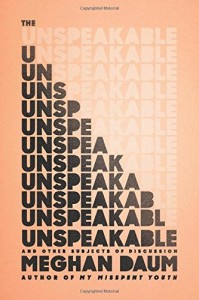The Unspeakable by Meghan Daum
 This book of essays has gained some excellent reviews … so I was excited when it was my turn for the Kindle library book.
This book of essays has gained some excellent reviews … so I was excited when it was my turn for the Kindle library book.
One reviewer said “Daum is her generation’s Joan Didion.”(Melissa Giannini). I should have clued in to “her” generation’s Joan Didion. I guess I’m in the actual Joan Didion generation – she’s one of my favorite writers. (Slouching Towards Bethlehem is brilliant.)
I also didn’t clue in to the title — “Unspeakable” — which is truly accurate — these essays are beautifully written and some of her writing spoke right to my heart, but too often her writing made me anxiously squirm in my chair — uncomfortable with her uncensored candidness — as if watching a stranger undress or the Maury Povich Show.
Ms. Daum’s subject matter ranges from a coldly sad essay on matricide with harsh observations about her mother — to the weird – playing charades with a group of Hollywood notables including Nicole Kidman.
In “Honorary Dyke” she disguises her slight homophobia as flirting with lesbianism.
The whole scene freaked me out enough to make me realize that I was not a lesbian so much as someone who appreciated a good haircut.
(I realized I was) Biologically straight, culturally lesbian.
See? Uncomfortably funny – I bet you’re hoping none of your gay friends see you giggling at this.
In “Difference Maker” Ms. Daum shares her experience of being both a big sister and a court appointed advocate for a foster child. Her unflinching look at the reality of being a foster teen will break your heart. She paints foster care, and the children within the system, in the harsh cruelty that it is. Did you know there are ‘adoption fairs’ where foster children have 5 minutes per couple to plead why they should be adopted? She nails it by calling this a barbaric form of speed dating.
Ms. Daum likes to show off her incredible vocabulary using words such as opprobrium, quotidian and hypnagogic. Click to get the definitions – I had to to.
Happily, her writing is often thoughtful and quietly disarming. For me, her writing shines when she explores aging and evolving.
How did I get to be middle-aged without actually growing up?
I had not yet figured out that life is mostly an exercise in being something other than what we used to be while remaining fundamentally — and sometimes maddeningly – who we are.
To grow up and get to know yourself is primarily an exercise in taking things off the table.
Her thoughts on women’s culture are noteworthy, as in this precise take on the media
…all the crap in the media that suggests that not only are women a special interest group, they’re a group whose primary interest is themselves.
With great beauty, Ms. Daum reveals her uncertainty about getting married (she does) and her choice to remain child free (which she is). But as I read her thoughtful angst over these major life decisions – I found her both immature and apologetic — as if seeking our approval for her choices.
Our conversations and our sleep would remain uninterrupted. Our lives would remain our own. Whether that was fundamentally sad or fundamentally exquisite, we’d probably never be sure. But who can be sure of such things? And what so great about being sure anyway?
Unspeakable can be light and funny in parts, as in when Ms. Daum talks about not having the least interest in food or the “foodie” movement.
Once or twice my husband has suggested we take a cooking class together. From my reaction, you would think he’d proposed that we volunteer to pick up trash alongside the highway.
And her secret desire to live at Downton Abbey:
More likely, I’d be dreaming of living at Downton Abbey. Flu epidemics and abysmal women’s rights aside, I often think living in a Jacobethan mansion in the early twentieth century and having my meals cooked and served by professionals would suit me just fine. That’s pretty preposterous, however. In reality it would be a nightmare. In reality I would be so intimidated by the servants and so awkward in their presence that the relief of not having to cook would be dwarfed by the pressure to make polite conversation. I’d end up taking dinner in my bedroom every night, like a grieving widow or an unseemly visiting artist.
The final essay, Diary of a Coma recounts her infection with a deadly virus and she takes us step by tedious step through her symptoms and misdiagnosis and eventually being put into a medically induced coma. Not for the queasy this, but nonetheless she contemplates her life, her judgmental tendencies, her shortsightedness and selfishness and vows to be a better person. But in the end she knows she can’t be a better person — in fact she won’t even try — she will, in the end, remain the same person. Her thoughts even as she faces death remain painfully unsentimental.
In summary, I read this collection of essays in uncomfortable but stunned disbelief – at Ms. Daum’s audacity, her often flawless writing, her shameless self-absorption — but most of all at her bravery – writing and exposing her uniquely own “unspeakable” mind.





